Here is the final statement from GAFCON 2018. There were 1950 people attending from 50 countries, including 316 bishops, 669 other clergy and 965 laity. The letter urges GAFCON members not to attend Lambeth 2020 unless ACNA is invited and Provinces which deviate from the Christian faith like TEC and the ACoC are disinvited.
It sends a very clear message to Justin Welby that, in spite of his bending Christianity to fit the whims of secular culture, his version of the faith is the one that is rapidly becoming irrelevant, not GAFCON’s. This really is good disagreement.
Letter to the Churches – Gafcon Assembly 2018
22nd June 2018
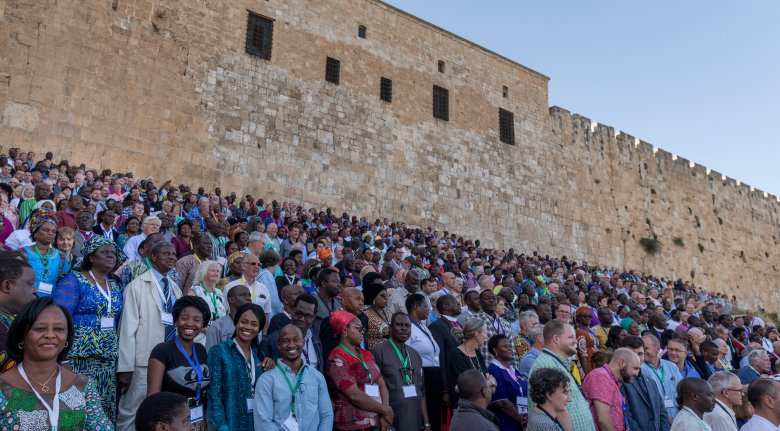
Greetings from the land of the birth, ministry, death, resurrection and ascension of our glorious Lord Jesus Christ. The third Global Anglican Future Conference (Gafcon) was held in Jerusalem in June 2018, a decade after the inaugural Gafcon in 2008. Gafcon 2018, one of the largest global Anglican gatherings, brought together 1,950 representatives from 50 countries, including 316 bishops, 669 other clergy and 965 laity. A unanimity of spirit was reflected throughout the Conference as we met with God in the presence of friends from afar. We celebrated joyful worship, engaged in small group prayer and were inspired by presentations, networks and seminars.
We met together around the theme of “Proclaiming Christ Faithfully to the Nations”. Each day began with common prayer and Bible exposition from Luke 22-24, followed by plenary sessions on God’s Gospel, God’s Church and God’s World.
PROCLAIMING GOD’S GOSPEL
We renewed our commitment to proclaim the gospel of the triune God in our churches and in all the world. Our Chairman reminded us in his opening address: “God’s gospel is the life-transforming message of salvation from sin and all its consequences through the death and resurrection of the Lord Jesus Christ. It is both a declaration and a summons: announcing what has been done for us in Christ and calling us to repentance, faith and submission to his Lordship.” It involves the restoration and reaffirmation of God’s original creative purposes. It is addressed to men, women and children and it is our only hope in the light of the final judgment and the reality of hell.
This is God’s gospel, the gospel concerning his Son (Romans 1:1–3). The centre of the gospel message is this one person, Jesus Christ, and all that he has done through his perfect life, atoning death, triumphant resurrection and glorious ascension. In our daily expositions, we followed Jesus’ path from the judgments by Pilate and the Jewish leaders, to his death for us on the cross, to his breaking the bonds of death on Easter morning and to his commission to the disciples to proclaim “repentance for the forgiveness of sins in his name to all nations” (Luke 24:47). The uniqueness of Jesus Christ lies at the heart of the gospel: “there is salvation in no one else, for there is no other name under heaven given to mankind by which we must be saved” (Acts 4:12). The gospel confronts us in the midst of our confusion and sin but it does not leave us there. It includes a summons to repentance and a call to believe in the gospel (Mark 1:15), which results in a grace-filled life. The ascended Christ gave his Spirit to empower his disciples to take this gospel to the world.
Yet faithful proclamation of this gospel is under attack from without and within, as it has been from apostolic times (Acts 20:28-30).
External attacks include superstitious practices of sacrifices and libations that deny the sufficiency of Christ’s sacrifice. Some religions deny the unique person and work of Christ on the cross, and others are innately syncretistic. Secularism seeks to exclude God from all public discourse and to dismantle the Christian heritage of many nations. This has been most obvious in the redefinition of what it means to be human, especially in the areas of gender, sexuality and marriage. The devaluing of the human person through the advocacy of abortion and euthanasia is also an assault upon human life uniquely created in the image of God. Militant forms of religion and secularism are hostile to the preaching of Christ and persecute his people.
Internally, the “prosperity gospel” and theological revisionism both seek in different ways to recast God’s gospel to accommodate the surrounding culture, resulting in a seductive syncretism that denies the uniqueness of Christ, the seriousness of sin, the need for repentance and the final authority of the Bible.
Tragically, there has been a failure of leadership in our churches to address these threats to the gospel of God. We repent of our failure to take seriously the words of the apostle Paul: “Keep watch over yourselves and all the flock of which the Holy Spirit has made you overseers. Be shepherds of the church of God, which he bought with his own blood. I know that after I leave, savage wolves will come in among you and will not spare the flock. Even from your own number, men will arise and distort the truth in order to draw away disciples after them” (Acts 20:28-30).
We dedicate ourselves afresh to proclaiming Christ faithfully to the nations, working together to guard the gospel entrusted to us by our Lord and his apostles.
REFORMING GOD’S CHURCH
The gospel of God creates the church of God. Through the invitation of the gospel, God calls all people into fellowship with his Son, the Lord Jesus Christ. As the word of the gospel goes forth in the power of the Holy Spirit, they respond through the work of the Holy Spirit to repent, believe and be baptised, and are thereby joined to Christ’s body which is his church (Acts 2:37-44; 1 Corinthians 12:12-13). As members of Christ’s body, they are sanctified in him, called to live lives of holiness and to be salt and light in the world.
One Conference speaker reminded us: “In the councils of the church, we should not mimic the ways of the world but gather to pray, to praise (i.e., to be eucharistic), to consult, to decide, and if necessary to discipline. These gatherings should be properly conciliar in nature, decisive in moving the church forward in its mission and common life. There should be the will to exercise loving but firm discipline to bring sinners to repentance and restoration.” Likewise at the Communion level, there are times when the leadership must come together to exercise its responsibility to discipline an erring member province.
For some time, our Communion has been under threat from leaders who deny the Lordship of Christ and the authority of Scripture. In the late 20th century, human sexuality became the presenting issue.
The 1998 Lambeth Conference by a huge majority (526 to 70) approved Resolution I.10 on Human Sexuality, which affirmed the teaching of Jesus in Matthew 19 that there are only two expressions of faithful sexuality: lifelong marriage between a man and a woman or abstinence. The resolution rightly called for pastoral care for same sex attracted persons. At the same time, it described homosexual practice as “incompatible with Scripture” and rejected both the authorisation of same sex rites by the Church and the ordination of those in same sex unions.
Lambeth Resolution I.10 reflected the rising influence of the Global South in the Communion. The ground for the Resolution had been prepared by the 1997 Kuala Lumpur Statement of the Global South Anglican Network. Our collaboration with the Global South Network has been ongoing, and its leaders took an active part in this Conference.
The subsequent rejection of Lambeth I.10 in word and deed by the Episcopal Church USA and later by some other Anglican provinces led to a “tear [in] the fabric of the Communion at its deepest level”, followed by ten years of futile meetings in which the four Instruments of Communion failed to exercise the necessary discipline. The Primates’ Meeting repeatedly called upon these provinces to repent and return to the faith. Yet their efforts were undermined by other Instruments of Communion, culminating in the failure of the Office of the Archbishop of Canterbury to carry out the clear consensus of the Primates’ Meeting in Dar es Salaam in 2007.
In the Jerusalem Statement and Declaration, the 2008 Global Anglican Future Conference took up the challenge of restoring biblical authority (and the teaching on human sexuality in particular) by affirming the primacy of the Bible as God’s Word written and going back to the other sources of Anglican identity – the Creeds and Councils of the ancient church, the 39 Articles, the 1662 Book of Common Prayer and the Ordinal. The Conference also constituted a Primates Council and authorised it to recognise Anglican churches in areas where orthodox Anglicans had been deprived of their church property and deposed from holy orders.
During the past twenty years, the Instruments of Communion have not only failed to uphold godly discipline but their representatives have refused to recognise our concerns and have chosen instead to demean Gafcon as a one-issue pressure group and accuse it of promoting schism, where in fact the schismatics are those who have departed from the teaching of the Bible and the historic doctrine of the Church. Slogans such as “walking together” and “good disagreement” are dangerously deceptive in seeking to persuade people to accommodate false teaching in the Communion.
We grieve for the situation of our global Communion as it has been hindered from fulfilling its God-appointed task of reaching the world for Christ. We repent of our own failures to stand firm in the faith (1 Corinthians 16:13). But we do not lose hope for the future, and note that there is strong support for the reform of our Communion. Prior to Gafcon 2018, delegates overwhelmingly affirmed the following propositions:
- Lambeth Resolution I.10 reflects the unchangeable teaching of the Bible;
- the Gafcon movement should continue to be faithful to the Jerusalem Declaration;
- the Primates Council should continue to recognise confessing Anglican jurisdictions.
Over the past twenty years, we have seen the hand of God leading us toward a reordering of the Anglican Communion. Gafcon has claimed from the beginning: “We are not leaving the Anglican Communion; we are the majority of the Anglican Communion seeking to remain faithful to our Anglican heritage.” As Archbishop Nicholas Okoh stated in the inaugural Synodical Council: “We are merely doing what the Communion leadership should have done to uphold its own resolution in 1998.”
We give thanks for the godly courage of our Gafcon Primates in contending for the faith once for all delivered to the saints. We applaud their decision to authenticate and recognise the provinces of the Anglican Church in North America and the Anglican Church in Brazil, to recognise the Anglican Mission in England and to consecrate a Missionary Bishop for Europe. This has become necessary because of the departure from the faith by The Episcopal Church, the Anglican Church of Canada, the Episcopal Church of Brazil and the Scottish Episcopal Church. At Gafcon 2018, we heard many testimonies of faithful Anglicans who have been persecuted by those holding office in their respective provinces, merely because they would not surrender to, nor be compromised by, the false gospel that these leaders profess and promote. We also recognise the Gafcon Primates’ willingness to assist faithful Anglicans in New Zealand where the Anglican Church has recently agreed to allow bishops to authorise the blessing of same sex unions.
As the Gafcon movement matures, it has also seen the need for a more conciliar structure of governance. We endorse the formation of Gafcon Branches where necessary and of a Panel of Advisors, comprising bishops, clergy and lay representatives from each Gafcon Province and Branch, to provide counsel and advice to the Primates Council. Together with the Primates, the Panel of Advisors form a Synodical Council to bring recommendations to the Gafcon Assembly. The Synodical Council met for the first time at this Conference.
In light of the recommendations of the Synodical Council, we respectfully urge the Archbishop of Canterbury
- to invite as full members to Lambeth 2020 bishops of the Province of the Anglican Church in North America and the Province of the Anglican Church in Brazil and
- not to invite bishops of those Provinces which have endorsed by word or deed sexual practices which are in contradiction to the teaching of Scripture and Resolution I.10 of the 1998 Lambeth Conference, unless they have repented of their actions and reversed their decisions.
In the event that this does not occur, we urge Gafcon members to decline the invitation to attend Lambeth 2020 and all other meetings of the Instruments of Communion.
REACHING OUT TO GOD’S WORLD
Our conference theme has been “Proclaiming Christ Faithfully to the Nations.” We have received the gospel through the faithful witness of previous generations. Yet there are still billions of people who are without Christ and without hope. Jesus taught his disciples: “this gospel of the kingdom will be proclaimed throughout the whole world as a testimony to all nations” (Matthew 24:14).
We repent for the times and seasons when we have only preached to ourselves and not embraced the difficult task of reaching beyond our own cultural groups in obedience to God’s call to be a light to the nations (cf. Acts 13:47). In faith and obedience, we joyfully recommit ourselves to the faithful proclamation of the gospel.
In order to expand our ability to proclaim Christ faithfully to the nations in both word and deed, we launched nine strategic networks.
Theological Education: To promote effective theological training throughout the Anglican Communion
Church Planting: To expand church planting as a global strategy for evangelisation
Global Mission Partnerships: To promote strategic cross-cultural mission partnerships in a globalized world
Youth and Children’s Ministry: To be a catalyst for mission to young people and children of all nations so that they may become faithful disciples of Jesus Christ
Mothers’ Union: To expand the potential of this global ministry to promote biblical patterns of marriage and family life
Sustainable Development: To establish global partnerships which work with the local church to bring sustainable and transformative development
Bishops Training Institute: To serve the formation of faithful and effective episcopal leadership throughout the Communion
Lawyers Task Force: To address issues of religious freedom and matters of concern to Anglican lawyers and Chancellors and to further the aims of the Jerusalem Declaration
Intercessors Fellowship: To inspire and develop globally connected regional and national intercessory prayer networks
In the world into which we go to proclaim the gospel, we shall encounter much which will need us to walk in paths of righteousness and mercy (Hosea 2:19; Micah 6:8). We commit to encouraging each other to give strength to the persecuted, a voice to the voiceless, advocacy for the oppressed, protection of the vulnerable, especially women and children, generosity to the poor, and continuing the task of providing excellent education and health care. As appropriate, we encourage the formation of other networks to assist in addressing these issues.
OUR GLOBAL ANGLICAN FUTURE
To proclaim the gospel, we must first defend the gospel against threats from without and within. We testify to the extraordinary blessings on this Conference, which leads us to call upon God even more, that the Anglican Communion may become a mighty instrument in the hand of God for the salvation of the world. We invite all faithful Anglicans to join us in this great enterprise of proclaiming Christ faithfully to the nations.
Now to him who is able to do immeasurably more than all we ask or imagine,
according to his power that is at work within us, to him be glory in the church
and in Christ Jesus throughout all generations, for ever and ever! Amen.
Ephesians 3:20-21
GLOSSARY
Conciliar – Working as a council of the church
Gafcon Branches – A Branch may be established by application to the Gafcon Primates Council in a province whose Primate is not a member of the Gafcon Primates Council.
Gafcon Primates – Primates who have endorsed the Jerusalem Declaration and have been admitted to the Gafcon Primates Council.
Gafcon Provinces – Provinces whose House of Bishops or Provincial Synod have endorsed the Jerusalem Declaration and whose Primate is a member of the Gafcon Primates Council.
Instruments of Communion – There are four Instruments: The Office of the Archbishop of Canterbury, the Lambeth Conference, the Primates’ Meeting and the Anglican Consultative Council. http://www.anglicancommunion.org/structures/instruments-of-communion.aspx
Jerusalem Statement and Declaration – The Statement agreed by the inaugural Gafcon Assembly in 2008. https://www.gafcon.org/resources/the-complete-jerusalem-statement
Kuala Lumpur Statement – approved by the Global South Anglican Network in 1997. http://www.globalsouthanglican.org/index.php/blog/comments/the_kuala_lum…
Lambeth Resolution I.10 – approved by the Lambeth Conference in 1998. http://www.anglicancommunion.org/resources/document-library/lambeth-conf…
Panel of Advisors – consists of one bishop, one clergy and one lay representative from each Gafcon Province and Gafcon Branch, who give counsel and advice to the Gafcon Primates.
Primates’ Meeting – A meeting of Primates called by the Archbishop of Canterbury
Synodical Council – Consists of the Panel of Advisors and the Gafcon Primates Council meeting together to make recommendations to the Gafcon Assembly
Like this:
Like Loading...
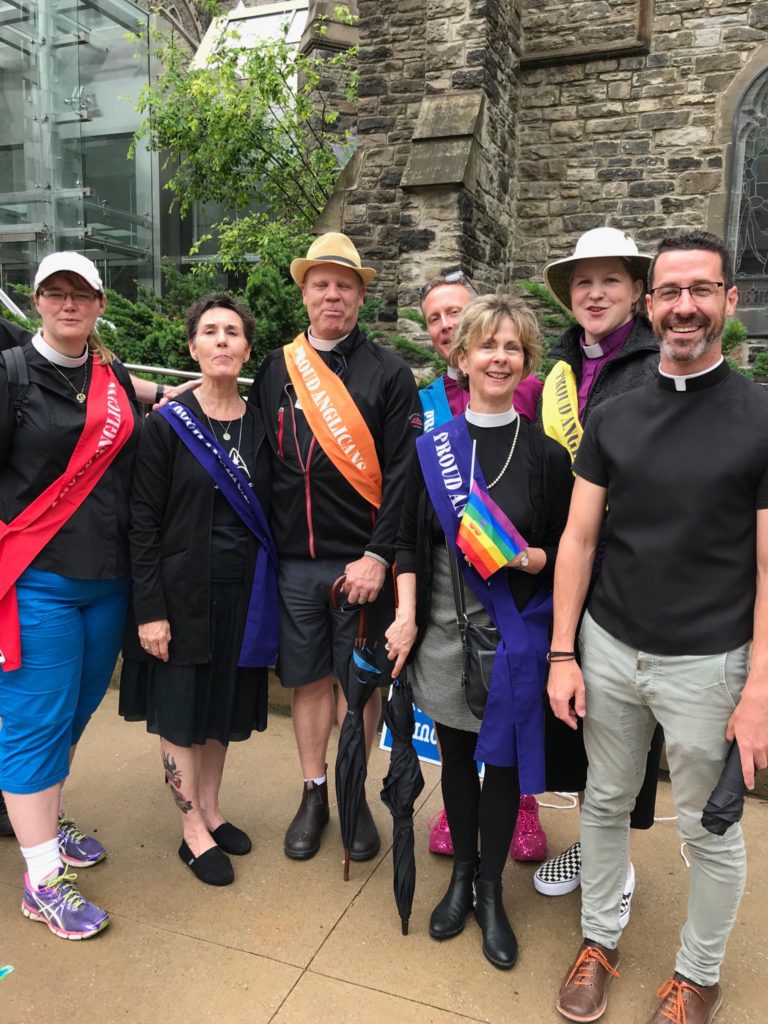


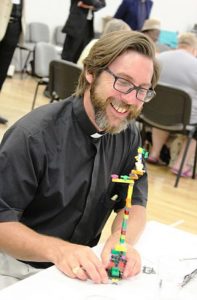 The Church of England wants to build a new future… using Lego.
The Church of England wants to build a new future… using Lego.

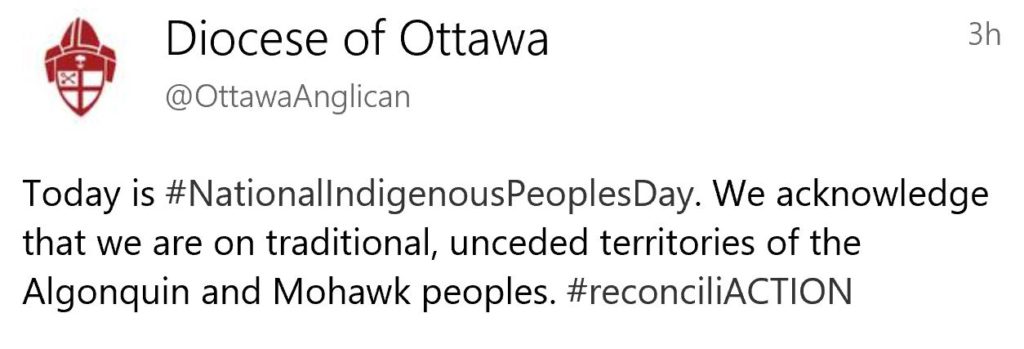


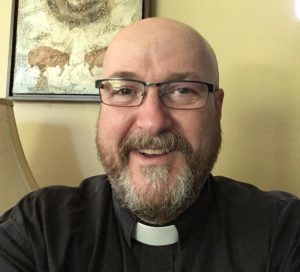 Woodcroft, 57, says he is “overwhelmed by the generous expression of the diocese” and surprised by the numbers of votes he received. He was elected on the fifth ballot, after receiving 48 votes from clergy and 75 from the laity. “It’s an absolute thrill,” he says.
Woodcroft, 57, says he is “overwhelmed by the generous expression of the diocese” and surprised by the numbers of votes he received. He was elected on the fifth ballot, after receiving 48 votes from clergy and 75 from the laity. “It’s an absolute thrill,” he says.